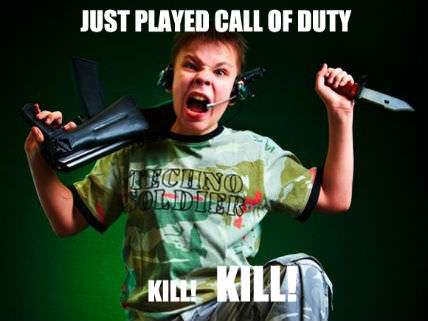Are Violent Video Games Digital Poison?
The American Psychological Association thinks so.

In August, a task force organized by the American Psychological Association (APA) issued a report claiming there is "a consistent relation between violent video game use and heightened aggressive behavior, aggressive cognitions, and aggressive affect and reduced prosocial behavior empathy and sensitivity to aggression." The task force of seven scholars had reviewed the research literature on video games and violence since 2005, when the APA had issued another statement on the subject. That one similarly stated that "exposure increases aggressive behavior, increases aggressive thoughts, increases angry feelings, decreases helpful behavior, and increases physiological arousal."
The APA task force has basically taken one side in professional psychologists' ongoing civil war over video game violence. One of the leading proponents of the idea the playing violent video games produces real world mayhem, the Iowa State psychologist Craig Anderson, claimed with dismay that "there are no major media violence experts on the Task Force. Not one." On the other hand, one of the leading research skeptics, the Stetson University psychologist Christopher Ferguson, points out that four of the seven members of the task force had publically expressed concerns about the deleterious effects of video game violence.
Two of those four, Sherry Hamby of the University of the South and Kenneth Dodge of Duke, had signed an amicus brief in the 2011 Supreme Court case Brown v. EMA, which claimed that "data continually strongly suggest that participating in the playing of violent video games by children increases aggressive thought and behavior; increases antisocial behavior and delinquency; engenders poor school performance; and desensitizes the game player to violence." Another member of the panel, the UCLA researcher Sandra Graham, signed a 2012 statement that asserted, among other things, that "exposure to media violence (e.g., TV, movies, video games) can increase the likelihood of physically and verbally aggressive behavior, aggressive thoughts, and aggressive emotions," and which identified a "strong need to revise policies on youth exposure to violence in the media." Yet another member, the Georgetown University psychologist Sandra Calvert, published research back in the 1990s that said players of a virtual reality game had more aggressive thoughts and higher physiological arousal.
Interestingly, the new APA review states that its authors were "asked to disclose any research or publication activity or commitment to a fixed position through public statement or publication or through other personal or professional activity related to the current task." Evidently endorsing amicus briefs, signing statements, or publishing research were not disqualifying conflicts.
Back in 2013, 230 researchers signed an open letter to the APA urging the task force to seriously address the issues of publication bias and non-replication of studies. They argued that studies finding a positive effect get published whereas those that report null findings do not, thus skewing the literature. The letter concluded that "policy statements based on inconsistent and weak evidence are bad policy and over the long run do more harm than good, hurting the credibility of the science of psychology." None of the signatories to that letter were invited to join the task force.
Meanwhile, a team led by Ferguson has published a new paper in the journal Computers in Human Behavior. These researchers had teenagers play video games that were closely matched for excitement—a violent first-person shooter versus a highly competitive car racing game. (They also pre-tested the kids for various psychological tendencies to see if video games exacerbated underlying psychological problems.) A second experiment focused on slower narrative games, again contrasting violence with competition. And a third correlational study explored whether violent video games engendered more aggression than reading violent books. The correlational study looked to see if there was any association between consuming violent content and various measures of delinquency.
As they report, "None of the studies provided evidence for concerns linking video game violence to aggressive behaviors or reduced empathy in youths." (For example, players of violent games did not show more aggression than players of competitive games by dunking people's hands in ice water more frequently or for longer periods of time.) In addition, they did not find that playing violent video games or reading books with violent content worsened any preexisting mental health problems or contributed to delinquent behaviors.
This is just one more study, of course, and it surely cannot be considered dispositive. But as Ferguson and his colleagues point out, "Coupled with a steady decline in youth violence by nearly 90 percent during the years in which video games soared in popularity, data is beginning to converge to suggest that perhaps there may be more productive avenues to consider when investigating youth's involvement with media rather than to focus on the moral issue of violent content." Even the APA task force acknowledged that "insufficient evidence exists about whether the link extends to criminal violence or delinquency." If the playing of video games is not clearly causing any social problems, why does some large portion of professional psychologists feel the need to fuel a moral panic concerning them?
"The motives (for the APA or individual social psychologists) are fairly straightforward," Ferguson suggests in an email: "It's identifying a problem psychologists will run in to 'fix.'" He adds: "The APA is a professional guild that is meant to promote the profession of psychology. It's to their advantage to identify 'problems.' This will result in more grant money, more newspaper headlines, more professional prestige, more accolades from child welfare groups etc." The bottom line: "We shouldn't mistake them as purveyors of objective fact."


Show Comments (237)